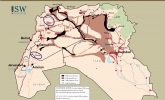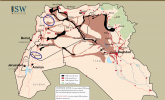Iraq Situation Report: September 15 - 17, 2015
September 17, 2015 - Sinan Adnan
Challenges are mounting against PM Abadi’s government and the ISF in Baghdad. Following the kidnapping of the 18 Turkish workers last week, likely by Iranian-backed Shi'a militias, this week witnessed the kidnapping of a former Sunni advisor from Anbar.










